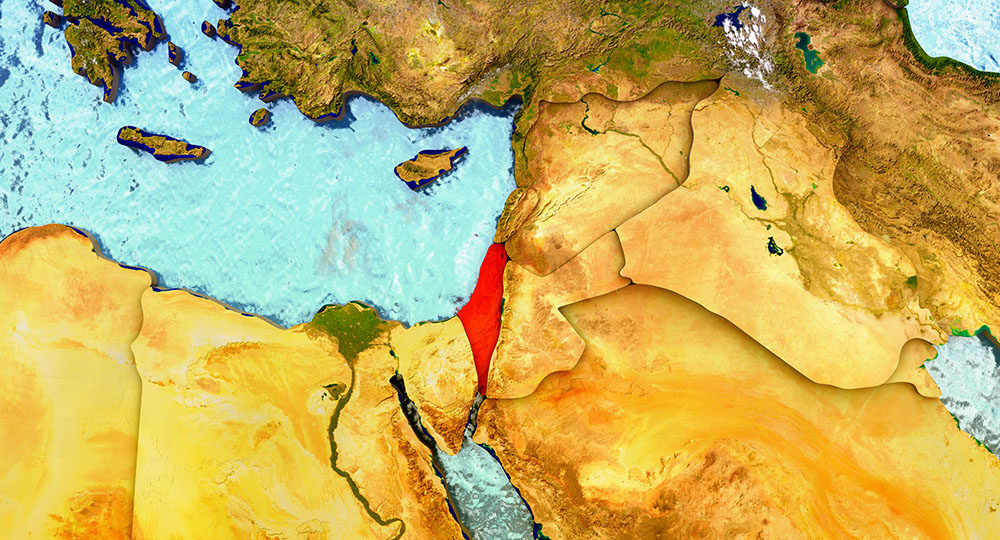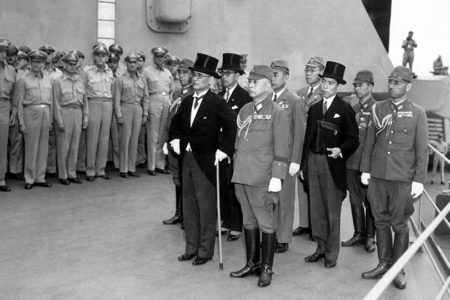Five Facts You Should Know About Israel
Have you ever wondered why Jewish people have been scattered throughout the nations of the world more consistently than any other people? Why anti-Semitism persists in rearing its ugly head repeatedly throughout history? Why Nazism specifically targeted the Jewish people for genocide in the Holocaust of World War II? Why the Jews have endured despite all their persecutions? Why they tenaciously hold on to the land they presently occupy in the Middle East? Why the modern State of Israel, despite its small size, is repeatedly the focus of the world’s attention?
The answers to these questions are found in certain basic facts about the nation of Israel. And knowledge of these facts is essential if you want to understand not only these issues, but God’s plan and purpose for history.
Fact One: Israel Has Had a Unique Relationship With God
Early in Israel’s history, God placed the nation into a relationship with Himself that no other nation was privileged to enjoy. In conjunction with that relationship, Moses made the following statements:
For thou art an holy people unto the LORD thy God; the LORD thy God hath chosen thee to be a special people unto himself, above all people who are upon the face of the earth (Dt. 7:6; cf. 10:15; 14:2).
And the LORD hath avowed thee this day to be his pecu liar people. . . . And to make thee high above all nations whom he hath made, in praise, and in name, and in honor, and that thou mayest be an holy people unto the LORD thy God, as he hath spoken (Dt. 26:18–19).
This unique relationship involved a number of special privileges. First, it involved Israel’s adoption as God’s firstborn son (Ex. 4:22–23; Rom. 9:4). Second, Israel was permitted to hear God’s voice at Mount Sinai (Dt. 4:10, 12, 32–33). Third, Israel saw and enjoyed a unique association with the shekinah glory of God (Ex. 24:16–17; 40:34–38; Dt. 4:36; 1 Ki. 8:10–11; Rom. 9:4). Fourth, God established covenants with Israel that He never established with any other people (Rom. 9:4). Fifth, God gave the Mosaic Law to Israel alone (Dt. 4:5–6, 8, 13; Ps. 147:19–20; Rom. 9:4). Sixth, only Israel had the worship structures (the Tabernacle and Temple) where God dwelt in a unique sense and the divinely ordained priesthood and sacrificial system of those structures (Ex. 25:8–9; 29:43–46; 1 Ki. 6:11–14, 17; Rom. 9:4; Heb. 9:1–10). Seventh, God made promises to Israel that He made to no other nation (Dt. 1:11; 6:3; 12:20; 15:6; 19:8; 26:18; 28; Rom. 9:4). Eighth, Israel had unique, intimate access to God (Dt. 4:7). Ninth, God intervened into history in an unparalleled, supernatural way to deliver Israel from its slavery in Egypt (Dt. 4:32, 34). Tenth, God gave Israel permanent ownership of the land of Canaan (Gen. 12:7; 13:14–15; 15:18–21; 17:8). Eleventh, God made Israel’s land and capital city (Jerusalem) holy, or unique, because He dwelt there in a unique sense (Neh. 11:1; Zech. 2:10–12; Rev. 11:2).
It is important to note that God established His unique relationship with Israel forever. He intended that relationship to be permanent. King David declared,
And what one nation in the earth is like thy people, even like Israel, whom God went to redeem for a people to himself, and to make him a name, and to do for you great things and awe-inspiring, for thy land, before thy people, which thou redeemedst to thee from Egypt, from the nations and their gods? For thou hast confirmed to thyself thy people, Israel, to be a people unto thee forever; and thou, LORD, art become their God (2 Sam. 7:23–24).
Fact Two: A Unique Reason Exists for the Special Relationship Between God and Israel
God did not choose Israel to be His special people because they were better than any other people. They were not better. They were descendants of Adam and Eve as were all other people; thus they were born with the same corrupt human nature and tendency to rebel against God as were the Gentiles. Even David, Israel’s great king, recognized that he was shaped in iniquity and conceived in a state of sin (Ps. 51:5). Moses repeatedly warned the people of Israel that they would tend to stray from God and His ways, and he told them, “The LORD did not set his love upon you, nor choose you, because ye were more in number than any people; for ye were the fewest of all people” (Dt. 7:7).
If God did not choose the people of Israel because they were better than other people, why then did He choose them for a unique relationship? According to Scripture, He did it based on His own sovereign will. On the basis of His sovereign will, God performed two special deeds for Abraham, Isaac, and Jacob, Israel’s ancestors (Rom. 11:28). First, He made those ancestors the special objects of His love (Dt. 4:37; 10:15); and second, He established a special covenant (the Abrahamic Covenant) with them (Dt. 7:7–9).
The fact that God chose Israel, not because that nation was better than any other but because of two special deeds He performed based on His own sovereign will, seems to imply that God had a sovereign purpose for the nation.
Fact Three: God Has a Unique Purpose for Israel
At least two details indicate that God indeed has a unique purpose for Israel. First, God declared that He created Israel for His glory (Isa. 43:7). The word glory refers to what is impressive, demands recognition, or gives a person influence. Thus God’s declaration indicated that, in a unique sense, He has purposed through Israel to impress the world with Himself, to obtain the world’s recognition, and to gain influence in the lives of His human creatures.
Second, when God established the Abrahamic Covenant, He not only promised to make a great nation (Israel) of Abraham’s physical descendants (Gen. 12:2), but He also vowed that all families of the earth would be blessed through that nation (Gen. 12:3; 22:18; 28:14). God thereby indicated that He purposed Israel to function as a unique channel of His blessing to the whole world.
How does God, through Israel, bring blessing to the world and glorify Himself before it, thereby fulfilling His unique purpose for that nation? He does so in several ways.
Through His Historic Dealings With Israel. Early in Israel’s national history, Moses promised the Israelites that if they heeded God’s Word and obeyed Him, God would do the following for them:
The LORD thy God will set thee on high above all nations of the earth. . . . The LORD shall cause thine enemies who rise up against thee to be smitten before thy face; they shall come out against thee one way, and flee before thee seven ways. . . . the LORD shall make thee the head, and not the tail; and thou shalt be above only, and thou shalt not be beneath (Dt. 28:1, 7, 13).
Moses also promised that if the Israelites rejected God’s Word and disobeyed Him (Dt. 28:15), then the following would happen to them:
The LORD shall send upon thee cursing, vexation, and rebuke, in all that thou settestthine hand to do, . . . Therefore shalt thou serve thine enemies whom the LORD shall send against thee . . . the LORD shall scatter thee among all people, from the one end of the earth even unto the other. . . . And among these nations shalt thou find no ease, neither shall the sole of thy foot have rest; but the LORD shall give thee there a trembling heart, and failing of eyes, and sorrow of mind. And thy life shall hang in doubt before thee; and thou shalt fear day and night, and shalt have no assurance of thy life (Dt. 28:20, 48, 64–66).
The result of God blessing Israel above all other nations if it heeded and obeyed His Word would be as follows: “And all people of the earth shall see that thou art called by the name of the LORD, and they shall be afraid of thee” (Dt. 28:10). The result of God chastening Israel more severely than other nations if it rejected and disobeyed His Word would be this: “And thou shalt become an astonishment, a proverb, and a byword, among all nations to which the LORD shall lead thee. . . . And they shall be upon thee for a sign and for a wonder” (Dt. 28:37, 46). These statements indicate that
God intended to make Israel an object lesson to the rest of the world. His dealings with Israel are designed to impress the world with two facts about God: (1) God blesses those who heed and obey His Word; (2) God will severely judge those who reject and disobey His Word.
Through a Unique Book. A second way God brings blessing to the world and glorifies Himself through Israel is through the unique book He has given to the world. The Bible is the only book that has been divinely inspired. In it God has revealed ultimate reality, the purposes of history and life, the origin and destiny of man, how sinful man can be made right with a holy God, and how people are to live. Over the centuries, God’s book has brought untold blessing to great multitudes of people. God gave the Bible to the world almost exclusively through the nation of Israel (Dt. 4:5–6, 8; Ps. 147:19–20; Rom. 3:2). This fact indicates that God intended Israel to be the instrument through which He would give the world its most significant book.
Through the Messiah-Savior. A third way God has glorified Himself and brought blessing through Israel has been through the Messiah-Savior, Jesus Christ. When Adam, who had been appointed by God to function as His representative to administer His rule over the world, yielded to Satan’s temptation to rebel against God (Gen. 1:26–28; 3:1–6), Satan thereby usurped the rule of the world system away from God (Lk. 4:5–6). This angelic enemy of God has been dominating the world system ever since (Jn. 12:31; 2 Cor. 4:4; 1 Jn. 5:19). In addition, man’s original sin of rebellion against God brought tragic consequences for the earth and himself. For example, man experienced a radical spiritual change (spiritual death) and became subject to God’s eternal judgment (Gen. 2:16–17; Jn. 3:18; Eph. 2:1–3).
Immediately after man’s original sin of rebellion, God announced that the key to His crushing of Satan and his evil rule in the world would be the coming and work of a special Redeemer who would be born of a woman (Gen. 3:15). Through the Old Testament prophets, God revealed two major lines of truth concerning this coming Redeemer (1 Pet. 1:10–12). First, the Redeemer would be the Savior of the world (Gen. 3:15; Ps. 22:1–18; Isa. 52:13—53:12). Second, the Redeemer would crush Satan and his world rule; would reestablish God’s rule over the world system; and would be God’s Messiah-King, His last representative to administer His rule over the entire earth (Gen. 3:15; Ps. 2; Isa. 9:6–7; 11; Dan. 7:13–14; Zech. 14).
Since the Messiah-Savior was to be born of a woman, He obviously would come into the world through the nation the woman belonged to. Through the Old Testament prophets, God revealed that Israel was the nation through which the Messiah-Savior would come (Gen. 49:10; Isa. 9:6–7; 11; Mic. 5:2).
The Messiah-Savior, Jesus Christ, did indeed come through Israel (Acts 13:22–23; Rom. 9:4–5). He was born of Mary, a young, righteous Jewess (Lk. 1:26–38; 2:1–7). Through His suffering and death on the cross, He took away the sin of the world and thereby provided salvation for man (Mt. 1:18–21; Jn. 1:29). At His Second Coming, He will crush Satan and his rule (Rom. 16:20; 1 Jn. 3:8; Rev. 19:11—20:3); reestablish God’s rule over the world system; and be God’s Messiah-King, the last Adam to administer God’s rule over the entire earth (Mt. 19:28; 25:31–34; Acts 3:19–21; 1 Cor. 15:23–25, 45; Rev. 20:4–6).
Thus God purposed that Israel would be the channel through which the key figure of all time would come—the Messiah-Savior through whom God fulfills His purpose for history and brings great blessing to the world.
Through Repentance. There is a fourth way God will glorify Himself and bring blessing through Israel. The Scriptures indicate that the Messiah will not crush Satan and reestablish God’s rule over the world system until the nation of Israel repents of its rebellion against God. (This repentance will involve accepting Jesus Christ as the Messiah-Savior, Dt. 30:1–10; Jer. 31:16–40; Ezek. 36:32–38; Hos. 3:4–5; 5:15—6:3; 14:1–8; Zech. 12:10—13:1, 9; 14; Acts 3:12–21). For this reason, John the Baptist, Jesus, and the apostles preached the gospel of the Kingdom (“Repent; for the kingdom of heaven is at hand”) to Israel only (Mt. 3:1–2; 4:17; 10:5–7; 15:21–26; Mk. 1:14–15). These facts indicate that God has purposed Israel to be a significant key to the future fulfillment of His purpose for history.
Fact Four: Israel Has a Unique Future
According to the Scriptures, Israel’s unique future will have a twofold nature. First, it will be characterized by unequalled suffering. Satan has attacked Israel many times throughout history. Because the Redeemer (God’s key to crushing Satan) was to be born through Israel, Satan repeatedly stirred up anti-Semitism against that nation in Old Testament times, hoping to prevent the Redeemer from coming. Because Messiah will not crush Satan and reestablish God’s rule over the world system until Israel repents, Satan has attacked that nation ruthlessly since Christ’s First Coming, trying to destroy it before it can repent. (The Holocaust of World War II is one such example.)
Despite how terrible these past assaults have been, Israel’s worst days are still ahead. During the last three and one-half years prior to Christ’s Second Coming, Satan, realizing his time is growing short, will try to annihilate Israel in a manner unparalleled in history (Dan. 9:27; Rev. 12). This period will be so bad that Scripture calls it “the time of Jacob’s trouble” (Jer. 30:7), describes it as an unprecedented time of great tribulation (Jer. 30:4–7; Dan. 12:1; Mt. 24:21), and indicates that two-thirds of the people of Israel will die (Zech. 13:8).
Second, Israel’s future also will be characterized by unequalled blessing. God will permit Satan to cause Israel’s worst time of suffering as His means of bringing that nation to repentance. The survivors (one-third of Israel) will repent when they see Jesus Christ in His glorious Second Coming and recognize that He is their true Messiah (Zech. 12:10–14; 13:9; Rom. 11:25–26).
In response to Israel’s repentance, God will forgive the nation’s sins (Zech. 13:1; Rom. 11:27), Messiah will crush Satan and his rule (Ps. 2; Zech. 14:1–5, 12–15; Rev. 19:11—20:3), and will reestablish God’s rule over this Earth’s world system for one thousand years (Dan. 7:13–14; Zech. 14:6–11, 16–21; Rev. 20:4–6).
During this future rule of God through the Messiah, Israel will enjoy unique blessing. The nation will be in a right relationship with God and obedient to Him (Jer. 31:31–34; Ezek. 36:24–27). Israel will be the spiritual minister of the world, leading the Gentiles in the worship of God (Ex. 19:5–6; Isa. 61:6; Zech. 8:23). A magnificent Temple will be built in Jerusalem as a center of worship (Ezek. 40—46). All nations will come to Jerusalem to worship God, receive instruction, and have judicial matters settled (Isa. 2:1–4; 60:14; Zech. 8:20–23; 14:16–21). The people of Israel will be restored permanently to their homeland, and God will prosper them abundantly (Ezek. 34:11–14, 22–31; 36:24, 28–38; 37:21–28).
Fact Five: Israel Has Been Given Permanent Ownership of a Unique Land
In light of God’s unique purpose for Israel (to glorify Himself before the world and to bring blessing to the world through Israel), it was essential that God place the nation in a unique location where it would have attention and influence out of proportion to its size. God did exactly that. He gave Israel the land of Canaan, perhaps the most strategic location in the world for attention and influence. Canaan is the crossroads of Asia, Africa, and Europe; and for centuries the major trade and military routes of the ancient world passed through that land. Because of Israel’s location, the major world powers have had to deal with that nation.
Moses clearly taught that God gave Israel the land. It belongs to the Jewish people. He gave it, not because the nation deserved it, but because of His own sovereign purposes (Dt. 9:4–6). Therefore, Israel’s ownership of the land does not depend on the nation’s merit.
Moreover, the fulfillment of Israel’s unique, God-ordained future requires that it own the land of Canaan forever. This is so because that future involves Israel’s permanent restoration to that land. And in line with this requirement, God, through the Abrahamic Covenant, solemnly guaranteed Israel’s permanent ownership of the land (Gen. 12:7; 13:14–15; 15:18–21; 17:8).







